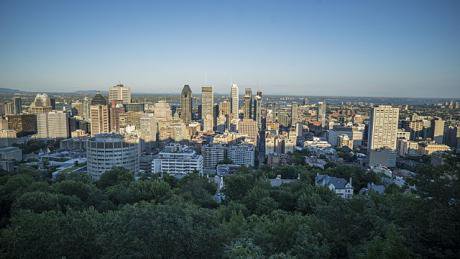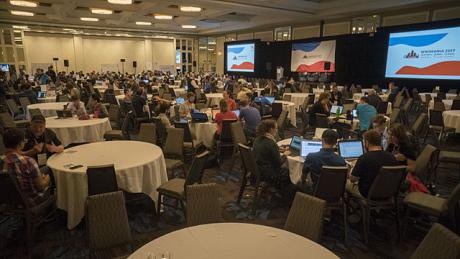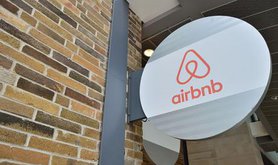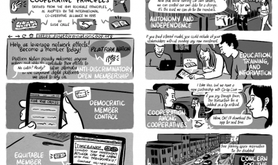
Montreal Skyline at Wikimania. John Lubbock/Wikimedia Commons. CC BY-SA 4.0.
Closed governments hate open systems. It’s so obvious, there’s almost no point in saying it. Yet Wikipedia’s very obviousness, its ubiquitousness in the information ecosystem of modern Western societies is the very thing that seems to make it go unnoticed. It doesn’t invade your life with its push notifications and little red update buttons that offer you a dopamine release in exchange for clicking them until they disappear. It’s not about you and your personal brand, offering you a way to advertise in exchange for making you the product.
Wikipedia is now (in terms of hours of work), the largest collaborative human endeavour ever undertaken.
It won’t hit you over the head with constant advertising, except for its own when it asks for donations. These donations go towards the server costs, the staff who support the website and update the MediaWiki software it all runs on, develop new projects, and support the community of Wikimedians around the world who volunteer millions of hours to create what is now (in terms of hours of work), the largest collaborative human endeavour ever undertaken. Yet unlike the pyramids announcing the greatness of some king or other, Wikipedia is a self-effacing humanist project, dedicated to creating "a world where every human being has access to the sum of all knowledge", in their own language, and for free.
This weekend the community of people who contribute to Wikipedia (and its sister projects) meets in Montreal for their annual conference, Wikimania. Hundreds of editors, developers, staff and other community members meet every year in a different location to talk about where our work is heading, and I find it wonderful that so many people care so much about creating free, open source information which can benefit the world in ways we have not even imagined yet.
Last week, our community learned of the murder of Bassell Khartabil, a Palestinian Wikimedian who was head of Creative Commons Syria and started a website to record Syria’s cultural heritage before it was obliterated by the civil war. The news did not come as much of a surprise to those of us who had followed his case, but though we may never have met him, there was a feeling of losing a fellow traveller, and that our community was under attack.
In May, the Turkish government decided to block the entire Wikipedia domain.
In May, the Turkish government decided to block the entire Wikipedia domain, comprising all 298 language versions of Wikipedia, including Latin, Scottish Gaelic and a number of native American languages. All this because it objected to references in two articles to claims that Turkey’s security services had been smuggling arms to extremist groups in Syria. Due to Wikipedia’s secure servers, individual pages cannot be blocked, so the only answer for an angry authoritarian is to block it all.
China did exactly the same thing in 2015, though in both of these countries, using a VPN or changing your DNS can usually get around the filtering. Turkish techies have also mirrored Wikipedia on numerous servers, and there is also the option to download a partial offline version of Wikipedia if you want to do so. Unlike some commercial companies, Wikimedia has no incentive to cave into authoritarian demands to self-censor. Part of the way the charity protects itself legally is by not controlling the content the community creates. It’s not up to us to edit pages or remove content people don’t like.
English Wikipedia has close to 5.5 million articles, and around 130,000 regular editors, meaning that it is constantly patrolled and peer-reviewed, helping it to stay free from vandalism and systemic bias. Don’t be fooled by the lazy journalism that especially sports writers like to do about how X sports player had his page ‘hacked’; the offending content was probably removed about 5 minutes after they screenshot it.

Participants at the hackathon at Wikimania 2017 in Montreal. John Lubbock/Wikimedia Commons. CC BY-SA 4.0.
This is not to say that the information is complete by a long way. There are still too many companies who go around inserting advertising copy into their Wikipedia articles, and there are still millions of people who do not have access to the internet. Global internet penetration has recently passed 50% with 66% of people now using mobiles globally. As billions of people connect to the internet in the coming decades, it is vital they have access to free, unbiased information.
Wikipedia’s biggest problem, of diversity, is also related to the way closed societies seek to control the information their citizens have access to. The answer to bad information is more information, and our biggest challenge is to get more information on Wikipedia about women and non-Western cultures. Surveys have shown that the big majority of Wikipedia editors are men from Europe and North America.
Wikipedia’s biggest problem, of diversity, is also related to the way closed societies seek to control the information their citizens have access to.
This systemic imbalance in the people who contribute to Wikipedia (and the other Wikimedia projects) creates a systemic bias which will take a lot of work to reduce. If you want information about Kurdish culture, or you want to study Basque or find sources in Arabic or Kiswahili, the available information on Wikipedia is only a fraction of that in English.
Authoritarian governments like Kazakhstan, Syria or Zimbabwe are afraid of a fast, unmonitored internet infrastructure which offers access to this kind of information, so if they can’t control the information, they will probably block the IP address on the network. But governments change, and access to better information will always be a part of that change.
Some people I talk to still don’t realise that they can edit Wikipedia themselves. We often get people phoning our office to ask us to remove something from the site that they find objectionable (including, once, their own date of birth). This is another aspect of the fact that Wikipedia is not-for-profit and doesn’t spend any money on advertising itself, despite the fact that English Wikipedia alone receives 7.3 billion pageviews a month.
In emerging economies, understanding and knowledge of Wikipedia and how it works is even more limited, with over 75% of people in Nigeria and India saying they have never heard of Wikipedia. Then there’s the very many people who think that Wikileaks is part of the same organisation. Wikileaks is not even based on a ‘Wiki’ – software that allows anyone to edit pages.
In the UK, we are trying to encourage our diaspora and minority language communities to get involved with editing Wikipedia. The English Wikipedia is already very good, and if we are to realise the goal of giving everyone in the world access to the sum of all knowledge, we need to encourage more people to contribute to smaller Wikipedias, like Kurdish or Scottish Gaelic, both of which have just a fraction of the articles that exist on the English Wikipedia.
With the Kurdish community in particular, we are trying to encourage people to look at the reconstruction and development of the Kurdish regions in the long term, and to show them how important a free, open encyclopaedia will be to the future development of the education sector in Kurdistan.
You have to chip away at oppression and prejudice over decades, and small acts of defiance build up like a hill.
Open Access technology is a prerequisite to a more open society. If you want to contribute to reducing global inequalities, improving a minority language Wikipedia is one of the best ways you can do it, short of giving away all your possessions or dedicating your life to building schools in sub-Saharan Africa. You probably won’t receive any recognition for your work, but in 100 years, many millions of people may have read your words, never knowing that it was you who wrote them. You may have helped a doctor save a life, or helped someone to get a job, but you will never be aware of it. That is not something you can put a value on, but there is a kind of beauty to it.
Authoritarian regimes are never toppled in a day. You have to chip away at oppression and prejudice over decades, and small acts of defiance build up like a hill that you climb every day, depositing a small amount of dirt until the hill becomes a mountain that can’t be ignored. We always say that Wikipedia is a work in progress; it’s not perfect, but it’s pretty amazing, and nobody needs anybody’s permission to help improve it.
I’ve no idea what humanity will look like in 100 years, but as long as we are still here, we hope that Wikipedia will be here too, educating millions of people and providing transparent, free and neutral information that will be used in ways we cannot anticipate yet. One thing I think is certain is that today’s dictators will be long dead, and it is unlikely that history, or their Wikipedia pages, will look favourably on their crimes.
Read more
Get our weekly email



Comments
We encourage anyone to comment, please consult the oD commenting guidelines if you have any questions.